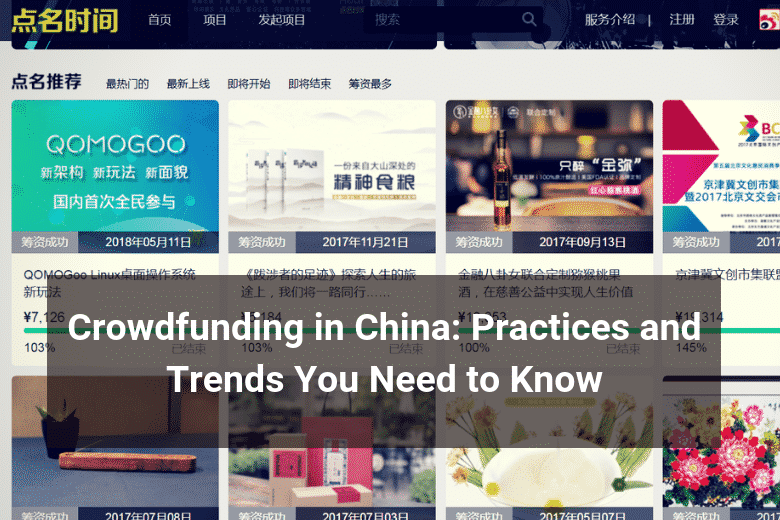Crowdfunding only hit the business world a decade ago, but it has already revolutionized the way we do business. Through platforms like Indiegogo and Kickstarter, any entrepreneur with a strong idea and a good plan can attract backers to financially support their product. When banks are unwilling or unable to lend entrepreneurs and innovators the necessary capital to get their ideas off the ground, crowdfunding provides an ideal solution.
Crowdfunding has been incredibly successful in the US, supporting products like the Oculus virtual reality headset and SkyBell video doorbell, but what about even larger economies? The Chinese market is growing faster than anyone could have predicted, but is there space for crowdfunded products in the huge world of Chinese business?
Does crowdfunding exist in China?
Yes! It is true that the crowdfunding market in China isn’t as large or developed as that of the West. That said, Chinese businesses are increasingly raising capital through crowdfunding, gaining investments totaling more than $500 million USD in the first half of 2016 alone. China’s JD crowdfunding platform launched in 2014 and has already has already raised $670 million USD, approximately a fifth of what Kickstarter has amassed worldwide since 2009.
What do Chinese people think about crowdfunding?
Crowdfunding is popular in China, which makes sense given that Chinese people are the world’s biggest online spenders and have gravitated strongly toward shopping and investing online. Chinese consumers are keen microinvestors, with both big investors and fans of specific products pouring money into projects they want to support. In 2014, Yulebao, a Chinese platform from eCommerce giant Alibaba, which allows people to make microinvestments in upcoming movies, met its funding target of $11.77 million USD in just five days. Chinese consumers are proud early adopters of new products, particularly foreign ones, so the market is inherently suited to the crowdfunding model of investment.
In general, Chinese backers tend to be more focused on rewards than backers in the US and UK. Equity-based crowdfunding, where backers are offered equity shares in return for financial backing, is seen as more high risk and less appealing in China. Reward-based crowdfunding is more popular in China, particularly when potential backers can see a preview of the concept and are offered early access to the finished product. Accordingly, 69 percent of the Chinese crowdfunding projects hosted by 2015 involved reward-based crowdfunding.
How is crowdfunding different in China?
There are some notable differences between crowdfunding in China and in the West. While Western platforms like Kickstarter are independent entities, most Chinese crowdfunding platforms are run by eCommerce giants. Alibaba, JD.com (the Chinese equivalent of Amazon), and Xiaomi dominate both the eCommerce and crowdfunding markets in China.
Chinese laws and regulations around crowdfunding are still developing. The Securities Association of China issued its first draft of equity crowdfunding regulations in 2014, requiring investors to fulfill certain prerequisites in order to make investments, but these rules vary across industries and are continuing to develop. Currently, they don’t seem to be hampering China’s growing crowdfunding industry.
As discussed above, equity-based crowdfunding is also less popular in China than it is in the West. Chinese backers perceive equity-based projects to be riskier and as a result, the majority of Chinese-backed projects are rewards-based. It is important for entrepreneurs to offer a mock-up of the finished product to Chinese consumers. On top of that, offering a tangible reward and ensuring its delivery is a big advantage in the Chinese crowdfunding scene.
Which crowdfunding platforms are used in China?
As of 2016, there were more than 400 Chinese crowdfunding platforms, up from 283 in 2015, and the number is continuing to grow steadily. As we mentioned previously, the major crowdfunding platforms in China are run by eCommerce giants. Taobao (from Alibaba), JD, Xiaomi, and 360 are all running successful crowdfunding platforms.
There is also DemoHour, which runs in a similar manner to Kickstarter, whereby projects receive no funding if they don’t reach their funding goals. ZhongChou is a rewards-based platform that follows a similar all-or-nothing funding premise, having connected more than 2,000 projects with backers so far. AngelCrunch pitches itself as China’s number one equity crowdfunding platform, with more than 300 million RMB (over $43 million USD) raised so far. CTQuan has raised more than $4 million USD for their AngelList-style crowdfunding service.
While there are many challenges involved in starting up a company in China, it isn’t too difficult to begin crowdfunding on Chinese platforms. With the help of a Chinese speaker to overcome the language barrier, foreign innovators can reach a large market of interested consumers by pitching on Chinese crowdfunding platforms. This essentially helps to find financial backing and acts as early-stage advertising, introducing a product to the enthusiastic Chinese eCommerce market while it is still fresh and exciting. Rewards-based projects may be particularly successful, as long as foreign entrepreneurs can ensure that their products will be efficiently shipped to their Chinese backers.
Full Autonomy to the Foreign Parent Company
WFOE stands for Wholly Foreign-Owned Enterprise, sometimes also referred to as WOFE, is an organization set up in China, entirely owned by a foreign investor. This form is the most used market entry vehicle for foreign investors searching for new markets as China has become one of the world’s most interesting investment destinations. It offers foreign investors a highly flexible market entry. Also, it represents a 100% autonomous, financial legal entity, bearing lawful obligations independently. Learn more about China WFOE.
In conclusion:
Crowdfunding is rapidly changing the face of business in China. Chinese consumers are open to a wide range of products, both domestic and foreign, so it’s no surprise their market is booming. Thanks to this growing market, strong consumer base, and openness to new products, China is experiencing real growth in their developing crowdfunding sector.
Here at Floship, we can offer you efficient crowdfunding fulfillment so you can easily ship your rewards and products to backers and buyers all over the world. We’ve successfully fulfilled more than a hundred crowdfunding campaigns, and we’re ready to work with you.
Get in touch with us today to find out how Floship can help your crowdfunding campaign succeed in China.

Ready To Upgrade Your Logistic Solution?
Speak to Floship ecommerce logistic consultant about improving your global support chain today




